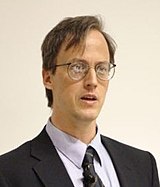William Dembski
| William A. Dembski | |
|---|---|
 |
|
| Born |
July 18, 1960 Chicago, Illinois |
| Education |
University of Illinois at Chicago (B.A., M.S., PhD), University of Chicago (S.M., PhD), Princeton Theological Seminary (M.Div.) |
| Known for | Intelligent design, specified complexity |
| Notable work | The Design Inference |
| Spouse(s) | Jana L. Dembski |
| Parent(s) | William J. Dembski and Ursula Dembski |
| Website | BillDembski.com |
William Albert "Bill" Dembski (born July 18, 1960) is an American mathematician, philosopher and theologian. A former proponent of the pseudoscientific principle of intelligent design (ID), specifically the concept of specified complexity, he was previously a senior fellow of the Discovery Institute's Center for Science and Culture (CSC). On September 23, 2016 he announced his official retirement from intelligent design, resigning all his "formal associations with the ID community, including [his] Discovery Institute fellowship of 20 years."
In 2012, he taught as the Phillip E. Johnson Research Professor of Science and Culture at the Southern Evangelical Seminary in Matthews, North Carolina near Charlotte.
Dembski has written books about intelligent design, including The Design Inference (1998), Intelligent Design: The Bridge Between Science & Theology (1999), The Design Revolution (2004), The End of Christianity (2009), and Intelligent Design Uncensored (2010).
The concept of intelligent design involves the argument that an intelligent cause is responsible for the complexity of life and that one can detect that cause empirically. Dembski postulated that probability theory can be used to prove irreducible complexity (IC), or what he called "specified complexity." The scientific community sees intelligent design—and Dembski's concept of specified complexity—as a form of creationism attempting to portray itself as science.
...
Wikipedia
